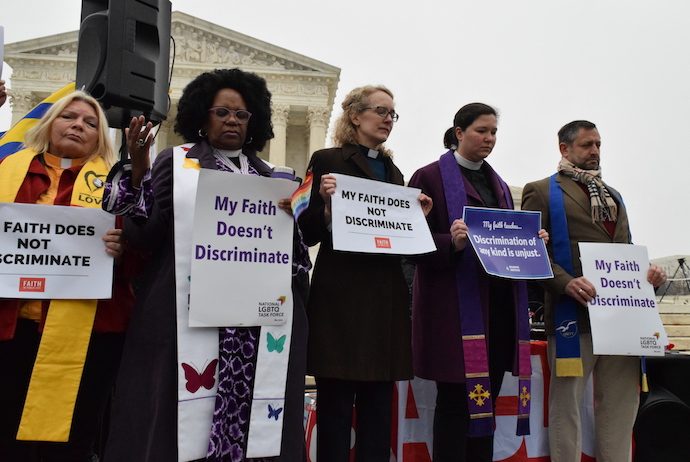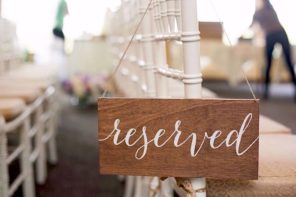Last weekend, I joined thousands of people of faith in praying for LGBTQ justice in anticipation of Tuesday’s oral arguments in Masterpiece Cakeshop v. Colorado Civil Rights Commission. Last month, I joined nearly 1,300 religious leaders in telling the Supreme Court, via amicus brief, that religious beliefs do not give businesses the right to discriminate.
As faith leaders, our religious traditions call us to weigh in on pressing social questions, but we do so at the risk of being considered “overly political.” Recently, while speaking to a journalist about why I chose to join the brief, I was asked if my position on this case is driven more by political concerns than religious ones. It’s a fair question, and there’s a clear answer: no.
I, like nearly 1,300 of my colleagues, am opposed to any attempt to use religious beliefs to justify discrimination for deeply theological reasons. It is my faith that compels me to actively seek justice for all people. That means advocating for civil rights and equal treatment for all. As a Christian, a pastor, and the leader of a religious organization, publicly proclaiming the dignity and worth of LGBTQ people and advocating for policies that respect and uphold that dignity is at the heart of my vocation.
There are others who argue that their Christian faith calls them to advocate for the right of the bakery in this case to deny service to same-sex couples based on his sincerely held religious belief that marriage is between one man and one woman. I disagree with this argument on theological grounds, but its fundamental problem is not theological. It’s that it misconstrues the meaning of religious freedom.
Religious freedom is one of the most fundamental principles of American democracy. The Constitution makes plain that the government should not interfere with an individual’s practice of their religion. But religious freedom does not give anyone the right to impose their beliefs on others, to harm others, or to discriminate when they operate as a public accommodation.
Jack Phillips, the baker in this case, is absolutely free to practice his religion. He can go to a church that teaches that marriage is between one man and one woman. He can protest in front of the Supreme Court in support of that belief. If he were a pastor, he could legally refuse to perform a wedding for a same-sex couple. But Masterpiece Cakeshop is a business open to the public; it cannot choose to deny service to same-sex couples.
If Phillips believes baking a cake for a same-sex couple violates his religious beliefs, he can choose not to operate a business. The same would be true if an atheist baker believed that baking a cake for a baptism violated their beliefs. An individual is free to hold and to practice such beliefs, but they are not free to use those beliefs to claim a right to discriminate in the public arena. Same-sex couples have been granted access to civil marriage under the Constitution, and they must be allowed to exercise that right freely, including buying goods and services from businesses open to the public.
The brief filed by Masterpiece Cakeshop’s attorneys goes so far as to say, “The cake, which serves as the iconic centerpiece of the marriage celebration, announces through Phillips’s voice that a marriage has occurred and should be celebrated.” While a wedding cake may, for some, be the centerpiece of their wedding reception, it’s hardly the “centerpiece” of a marriage celebration, especially from a religious perspective. Nor does the cake announce in any way that a marriage has occurred. It is the officiant, whether a religious leader or civil authority, who announces that a marriage has occurred. Indeed, the officiant must declare that the marriage has occurred for it to be a legal union in the United States.
It seems to me that Masterpiece Cakeshop and their attorneys are grasping at straws, willing to push the limits of the Constitution and pursue any means necessary in their quest for a constitutional right to discriminate.
When nearly 1,300 colleagues and I submitted our brief to the Supreme Court, we joined a long American history of people of faith advocating for justice in the civic and political arena: abolitionists, labor activists, civil rights leaders, clergy who helped women get access to contraception and safe abortions, and clergy who held space for LGBTQ people even before Stonewall.
Over the last 10 years, the movement of people of faith in support of justice and equal treatment for LGBTQ people has continued to grow, strengthen, and diversify. We must continue to seek justice and counter the voices of those who would misuse religion to advocate for discrimination. Far from being “too political,” this is simply working for justice and human dignity for all people. This is the bedrock of our faiths.





